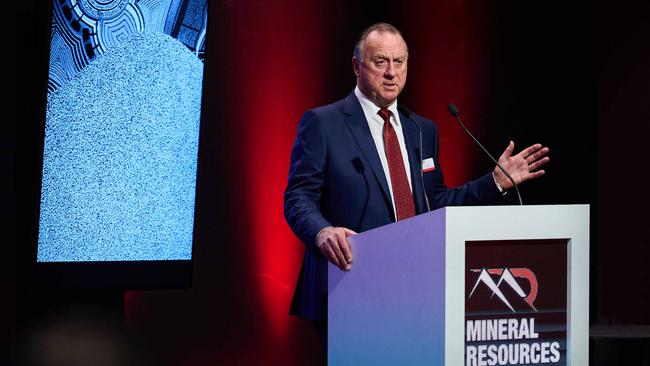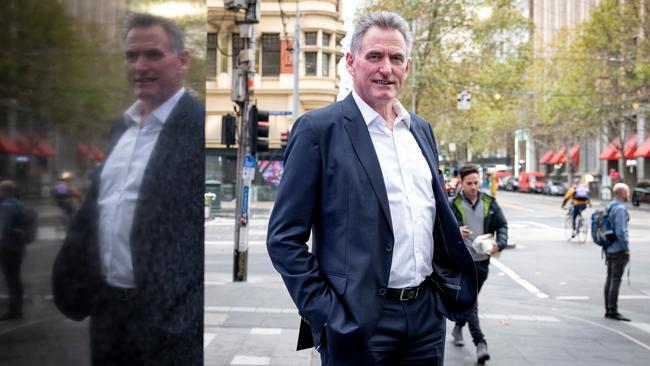Mineral Resources CEO Chris Ellison shuts down working from home
Mineral Resources CEO Chris Ellison has ‘shut down’ ideas of his staff working from home as he becomes the latest corporate heavyweight to declare an end to pandemic-era practices.

Mineral Resources chief executive Chris Ellison has “shut down” ideas of his staff working from home as he becomes the latest corporate heavyweight to declare an end to pandemic-era practices.
A week after NAB chief executive Ross McEwan told his senior leaders he expected them in the office five days a week, Mr Ellison said hybrid working was a no-go zone at his company.
“If you want to work from home, you don’t work here,” Mr Ellison said.
“We shut that down, and people like it because it gives them clarity. People have to work together and we keep them in the building all day long.”
Working from home – also known as remote or hybrid working – has been the biggest workplace trend of the 2020s, fuelled by Covid-19 lockdowns and mandatory isolation.
Some of Australia’s biggest companies – including Telstra, Medibank and ANZ – have adopted hybrid working permanently, finding a balance between working at the office and at home. It has been used as a non-monetary bargaining chip in a tight labour market and as a way for businesses to save money by reducing office space.
Health insurer NIB has paid its workers an extra $1200 a year to recognise that it is “renting space in people’s homes” while others are considering adopting four-day working weeks without any cuts to remuneration as they pull out all stops to retain staff. But like Mr McEwan, who opened a new office in Melbourne’s Bourke St in late 2021, Mr Ellison has invested heavily in Mineral Resources’ headquarters in Perth’s northern suburbs.
The $14bn mining company has even produced a video, featuring former foreign affairs minister Julie Bishop and Hollywood stars Hugh Jackman and Kate Walsh, to promote its new building at Osborne Park, which has a gym, GP clinic, creche and a restaurant with subsidised meals.

It is part of a new wave of business that believes that employees need a reason to come to the office – offering facilities so good it’s difficult to stay away – a model the tech industry adopted years ago.
“We looked a few years ago (at our workplace) and the environment that we have our people in, not just in our office but out on our sites and how we accommodate them … so we’ve gone down a very different path. We’re focused really heavily on the wellbeing of our people,” Mr Ellison told the Macquarie Australia conference.
“We basically want to completely change the environment they work in and they live in. We need to do that because the business is growing rapidly. We’ve got to recruit good people and once we get them through the door, we’ve got to hang on to them.
“It’s not just the pay package anymore, with the younger generation. In my day it was, but it’s not that anymore. There’s two or three things that are really more important than that: the environment, the opportunities they get and the lifestyle they lead. We’ve got to be able to try and make sure that we can accommodate all that to get the quality people that we want and to hang on to them.”
The company has since opened a second building nearby and found its new model has lifted productivity and fuelled a significant improvement in attracting and retaining staff.
“Our new head office we moved into about nine months ago, we built it to ‘American platinum standard’. What does that mean? It means that it’s got lots of space in there where people can move around, they can collaborate, they don’t have to just sit at a desk. We don’t want them sitting at the desk as much as they used to in the old days,” Mr Ellison said.
Western Australia Premier Mark McGowan has also encouraged more people to return to the office, given the knock-on benefits to the broader economy, and repeated that call in Perth on Sunday.
Companies that rely on manual labour, such as miners, logistics operators, and engineering and construction services, have taken a firmer line on hybrid working to prevent a situation where staff at head office are perceived to get all the perks.
This is a conundrum that Bupa, which has extensive operations across dental and optical clinics and aged care facilities, has also faced.
“It’s fine when you kind of contemplating an office worker and you say ‘well, you can work whenever you want, you know, here are the outcomes you have to deliver and if you can do it in four days, great’. But how do you translate that to the more than two-thirds of our people who are on the front line?” Hisham El-Ansary, Bupa’s former local boss, said earlier this year.
“Until we’ve got a bit of an answer for that, I think we need to just tread with caution.”
Mineral Resources – which employs about 6000 people, 1000 of whom are based at the headquarters – is also moving to make its mining sites more appealing, unveiling plans to build two “resort-style” villages at its Onslow iron ore project in the Pilbara.
Mineral Resources chief people and shared services officer Bronwyn Grieve said: “We want to redefine what it means to be a FIFO worker by creating a home-away-home and a genuine community environment.”
Additional reporting: Paul Garvey





To join the conversation, please log in. Don't have an account? Register
Join the conversation, you are commenting as Logout